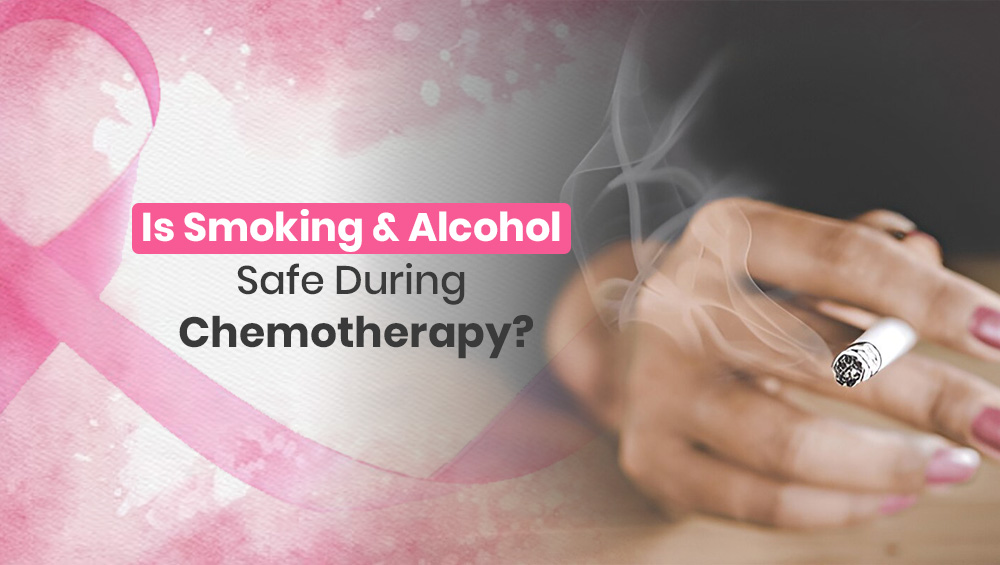Chemotherapy is a challenging journey, requiring significant lifestyle adjustments to maximize its effectiveness and minimize risks. Yet, questions about everyday habits, such as smoking or drinking alcohol, are often overlooked or clouded by misinformation. Is indulging in these habits safe during treatment? How might they impact your recovery and overall health during such a critical time?
This blog dives into the potential risks and effects of smoking and alcohol consumption during chemotherapy, offering clarity and expert insights. Whether you’re undergoing treatment or supporting a loved one, this information is essential for making informed and healthier choices.
Is it safe to drink wine and smoke during chemotherapy?
When undergoing chemotherapy, it’s natural to have questions about how lifestyle choices, such as drinking wine or smoking, might impact your treatment. While the occasional drink might not seem like a big deal, it’s important to understand the potential risks.
Alcohol, including wine, can interfere with the effectiveness of certain chemotherapy drugs. It may also worsen side effects such as nausea, fatigue, and dehydration, making recovery more challenging. Additionally, alcohol can inflame the liver, an organ that plays a critical role in processing both alcohol and chemotherapy medications. This inflammation can reduce the liver’s ability to metabolize chemotherapy drugs effectively, potentially diminishing their impact on cancer cells.
Smoking, on the other hand, poses an even more significant risk. It can not only exacerbate chemotherapy side effects like respiratory issues and fatigue but also hinder your body’s ability to heal. Smoking is known to impair the immune system and slow tissue repair, which can be especially concerning for patients already facing the taxing effects of cancer treatment.
How does alcohol affect drugs used in chemotherapy?
Alcohol consumption during chemotherapy can have significant impacts on the drugs used in treatment and the overall effectiveness of the therapy. Here are some key considerations:
- Interference with Drug Metabolism: Many chemotherapy drugs are metabolized in the liver, the same organ responsible for breaking down alcohol. Consuming alcohol may overburden the liver, potentially altering the metabolism of chemotherapy drugs, which can reduce their effectiveness or lead to unexpected side effects.
- Exacerbation of Side Effects: Chemotherapy already comes with side effects such as nausea, fatigue, and immune suppression. Alcohol can intensify these issues by contributing to dehydration, sleep disturbances, and an increased risk of infections due to its impact on white blood cell production.
- Increased Toxicity Risks: Combining alcohol with certain chemotherapy drugs can result in harmful interactions. For instance, alcohol’s toxic byproducts, such as acetaldehyde, may exacerbate the toxic effects of chemotherapy drugs on the liver and other organs.
- Lowered Immune Function: Chemotherapy suppresses the immune system, and alcohol further compromises it by affecting the production of red and white blood cells. This increases the risk of infections and complicates recovery.
Given these factors, healthcare professionals generally advise avoiding alcohol during chemotherapy to minimize risks and support the body’s recovery process.
Ultimately, it’s best to avoid both alcohol and smoking during chemotherapy to give your body the best chance to tolerate and respond to treatment. Speak with your oncologist about your habits—they can offer personalized advice based on your specific treatment plan and overall health.
When can you start drinking after taking chemo medications?
When it comes to drinking alcohol after chemotherapy, the timing can vary greatly based on several factors, including the type of chemo drugs used, the nature of your cancer, and your overall health. Your immune system’s condition, any lingering side effects, and other medications you might be taking also play a critical role.
The best advice? Always consult your healthcare team. They can provide tailored guidance and let you know if alcohol might interfere with your specific treatment or recovery plan. Prioritizing this conversation ensures your safety and helps support your healing process.
Why Consult Your Healthcare Team?
Your healthcare team understands the nuances of your treatment plan and can guide you on when it’s safe to reintroduce alcohol. They’ll consider your cancer type, the specific drugs you’ve been prescribed, and any concurrent treatments to provide personalized advice.
General Tips:
- Stay hydrated and maintain good nutrition during and after chemotherapy to help your body recover more effectively.
- If your healthcare provider permits alcohol, consider limiting your intake to small amounts and observe how your body reacts.
Remember, every individual’s journey is unique, and your safety should always come first. Discussing alcohol consumption with your doctor ensures you make informed choices that support your recovery.
Meet Dr. Pooja Babbar: Your Trusted Partner in Fighting Cancer
Dr. Pooja Babbar, a distinguished medical oncologist based in Gurgaon, stands as a beacon of hope for cancer patients. With an exceptional track record of successfully performing chemotherapy treatments, she has guided numerous individuals through their cancer journeys, empowering them to overcome challenges and reclaim their lives.
Known for her compassionate approach and expertise in advanced cancer care, Dr. Babbar combines cutting-edge therapies with personalized attention to deliver the best outcomes. Her unwavering dedication to helping patients fight cancer has made her a trusted name in oncology, inspiring confidence and resilience in everyone she treats.














